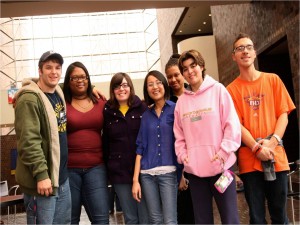 An individual born with a mental disability is faced with many obstacles, many of which the majority cannot understand. Social stigmas against the disabled these individuals create the widespread idea that these individuals cannot succeed as much as their peers, an idea that often becomes internalized.
An individual born with a mental disability is faced with many obstacles, many of which the majority cannot understand. Social stigmas against the disabled these individuals create the widespread idea that these individuals cannot succeed as much as their peers, an idea that often becomes internalized.
Transition Opportunities at UR (TOUR) looks to help integrate disabled students into a the college environment. Similar programs have been developed on campuses across the country to promote increased involvement and participation.
The philosophy of the TOUR program is to give students with disabilities additional support and resources that they need to succeed.
“I started to research into how I could help students with disabilities to have the opportunity to have the college experience as a more open and accessible option to them,” Warner School of Education graduate and Director of TOUR Catherine Branch Lewis said. “We all have the opportunity to change the world, and I think anyone and everyone should have the opportunity to benefit from everything that is offered here at the U of R.”
The Warner School is a recipient of the Transition Post-Secondary Program for students with Intellectual Disabilities (TPSID) grant. This is a federally-funded grant that has aided the TOUR program evolve from “an excellent and segregated program to an excellent and inclusive program,” Lewis said.
Today’s TOUR program has evolved beyond its previous form. The program is based out of a single classroom, Meliora 223. Here, teachers from the community partner with Board of Cooperation Education Systems (BOCES) come to teach about independent living and about the transition into adulthood.
This classroom has been the home base for 20 years, and has been used by students with disabilities who are either still in high school or just out of high school and need help in these areas.
Previously, students with disabilites have been somewhat segregated from the rest of campus, but since the initiation of the TPSID grant five years ago, TOUR has grown to extend far outside of this classroom. Now, the program gives participating students the opportunity to be included in the greater UR community.
“The students try to be in that classroom as little as possible,” Lewis said. “We want them to be involved in the campus as much as they can. But Meliora 223 will always be a resource for them to talk explicitly about things we usually take for granted: social skills, how to use the bus system, or how to buy an apartment.”
These students are now encouraged to take advantage of all the campus has to offer.
A vast staff of individuals are invested in integrating mentally disabled UR students as much as possible, while also helping them adapt to living independently.
Undergraduate coaches and mentors attend class with the students, make sure they understand their homework and coursework, and also guide them towards success on a college environment.
In addition, there are “peer supports” who make sure the students feel comfortable accessing resources in their own community. Together, they attend concerts, and peer supporters help the students get involved with other social groups on campus. Staff members also help the students find jobs and internships in the area.
Typically, after each 9am to 2pm school day, TOUR brings local students on big, yellow school buses to the UR campus. They then have the opportunity to use campus facilities, such as the Goergen Athletic Center, and to socialize and participate in clubs.
“We want [these students] to build relationships and partnerships here,” Lewis said. “TOUR offers helpful services to these students, but so does the rest of the world. This program shows that we are all interdependent, but that [we still] need support from friends and mentors. We [may] think we don’t need them but we really do, and these students with disabilities recognize that.”
Komar is a member of the class of 2016.
